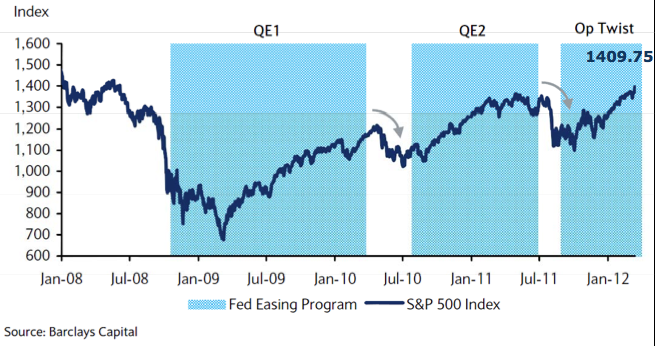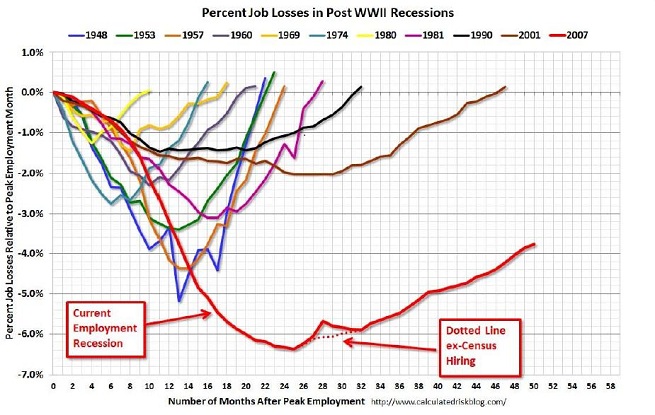When you've been working the markets as long as I have, you learn that the biggest dangers are always found in a place just over the horizon.
It's why I spend my time hunting for stories, news items and opinions that in the old days were considered far "below the fold."
Invariably, what I am looking for is the stuff that everybody else has missed.
Because I believe that's where the real information is -- especially when it comes to uncovering profitable opportunities others don't yet see or understand.
It's the story behind the story that interests me. To find it, you need to go beyond the headline news.
In that spirit, here's my take on five things that I'm thinking about right now.
5 "Over the Horizon" Investment Stories
1. Facebook amends its S-1 statement...for the sixth time!
An S-1 is a document filed with the SEC in conjunction with an upcoming Initial Public Offering (IPO). It's intended to give prospective investors an understanding of the basic business and financial information needed to consider the merits of an offering.
Facebook has now revised its documents six times since February 1, 2012.
This time around, Team Zuckerberg is admitting that - gasp - it's difficult to monetize users who are migrating to mobile devices and that the company has to spend more money to attract them. The company also commented that the number of average daily users is rising far more rapidly than the number of ad units being displayed to those users - and that average revenue per user will decline.
My Take: No question Facebook has changed the planet, but don't forget that the executives, venture capitalists and underwriters are the ones who make out on IPOs. These comments reinforce all the reasons why I suggest investors pass on the Facebook IPO. Speculators...that's a different matter, but don't confuse the two for three reasons: 1) Revenue growth is slowing; 2) Facebook does not dominate mobile devices and won't likely do so; 3) Startups are already cannibalizing Facebook's user base.
2. The seven largest U.S. phone companies report customers dropping long-term contracts
The seven largest U.S. phone companies reported in Q1 that 52,000 subscribers hung up on their long-term contracts. This is significant considering these companies represent 95% of the US market and account for 220 million devices according to the Associated Press.
My Take: Contract plans are the big earners and the Achilles' heel. As customers shift to cheaper, no-contract plans, watch revenues drop and phone companies shift to non-phone devices like security and data sharing. Apple is particularly at risk because the phone companies have subsidized sales and now face extinction-level events thanks to the very devices - iPads and iPhones - that changed the game. While I'd love to short "em, I am reluctant to play against the Fed and central banks at the moment (for reasons I'll get to next).
3. The Markets remain addicted to QE
Speaking of which...I've written and talked about this for several years in publications and at presentations worldwide but very few people have put two and two (trillion) together.
Here's a chart that might help:

My Take: QE is wrong on so many levels and robs economies of the very vitality they desperately need at the moment. Yet, our markets are addicted to cheap money. Without QE the markets drop, so the government-- which desperately needs growth to shed the toxic assets it has absorbed as part of the bailout process -- will continue to throw everything, including the kitchen sink, into this mess. Sadly, the responsible thing to do right now would be to take a deep breath, hold our noses and let everything reset. Unfortunately, our "leaders" will never allow that to happen.
4. Why we're turning Japanese ... and why Bernanke will hold rates lower even longer
Since 1948, there hasn't been another recession/economic deterioration anywhere close to the scale of what we are dealing with now, either in terms of depth or the length of time it will take to dig out. On an economic scale, that's just pabulum. But in human terms, the cost is very real and very devastating.

My Take: Low job creation and an even lower job participation rate create a Fed that's scared of its own shadow. Every 1% rise in interest rates is an additional $150 billion in interest payments to U.S. bondholders. Total debt including household, corporate and government obligations is already 279% of GDP. This is Japan's problem, only their total indebtedness is 512% of GDP. Today, Japan can't raise rates and avoid financial suicide...and we are rapidly approaching the same point of no return with each new, misguided stimulative effort. We are turning Japanese - a suggestion that I initially voiced in late 1999 to open scorn, derision and outright ridicule. Nobody's laughing now--including me.
5. What it takes to grow through a downturn
I hear it all the time...investors are desperately trying to convince themselves that there's no growth to be had and, therefore, there are no investments worth making.
My Take: This is a total copout. If you look at earnings, many of the world's best companies have not only pulled farther ahead during the financial crisis, but many continue to grow despite the fact that the world appears ready to go off a cliff.
I know the bar is low and I understand that CEOs are managing expectations, growth is slowing, etc.
But would you rather place your bet with a bunch of politicians who have no clue how real money works or a bunch of CEOs who have navigated international waters for decades?
Excluding the banks, I'm with the CEOs any day.
There are obviously a lot of variables when you look under the hood but generally speaking the kinds of companies that interest me have four things in common:
- They operate in highly localized markets like China and Brazil where their globally recognized brands can be brought to bear on a new generation of consumers hungry for them.
- They create products in industries they can dominate.
- Most are growing at 5% or more a year and are repositioning their operations in places like Oman, Vietnam, Bangladesh, Panama, Brazil and more. Never mind the BRICS of the past...the new markets...some call them frontier markets...have the potential to be even more profitable in the next 10 years than the formerly emerging markets were from 2000-2010 - no small change considering the latter turned 250% over that time frame, more according to CSS Zurich.
- All are involved in "needs" based industries at the moment like water, food and tech, for example. Until this crisis transitions, these are going to be the best places to protect wealth while also preemptively positioning for growth that will come on the other side eventually.
Anyway, that's today's missive in terms of what I see when I look over the horizon.
Now where did I put my French dictionary?
I am pretty sure I heard Germany's Chancellor Merkel say "merde" when Francois Hollande got elected...
Related Articles and News:
-
Money Morning:
Oil Price Manipulation: What President Obama Doesn't Understand About Oil -
Money Morning:
Stock Market Volatility: How to Beat the Market at its Own Game -
Money Morning:
Is JPMorgan (NYSE: JPM) Setting Delta Airlines (NYSE: DAL) Up For a Crash?
[epom]
About the Author
Keith is a seasoned market analyst and professional trader with more than 37 years of global experience. He is one of very few experts to correctly see both the dot.bomb crisis and the ongoing financial crisis coming ahead of time - and one of even fewer to help millions of investors around the world successfully navigate them both. Forbes hailed him as a "Market Visionary." He is a regular on FOX Business News and Yahoo! Finance, and his observations have been featured in Bloomberg, The Wall Street Journal, WIRED, and MarketWatch. Keith previously led The Money Map Report, Money Map's flagship newsletter, as Chief Investment Strategist, from 20007 to 2020. Keith holds a BS in management and finance from Skidmore College and an MS in international finance (with a focus on Japanese business science) from Chaminade University. He regularly travels the world in search of investment opportunities others don't yet see or understand.



